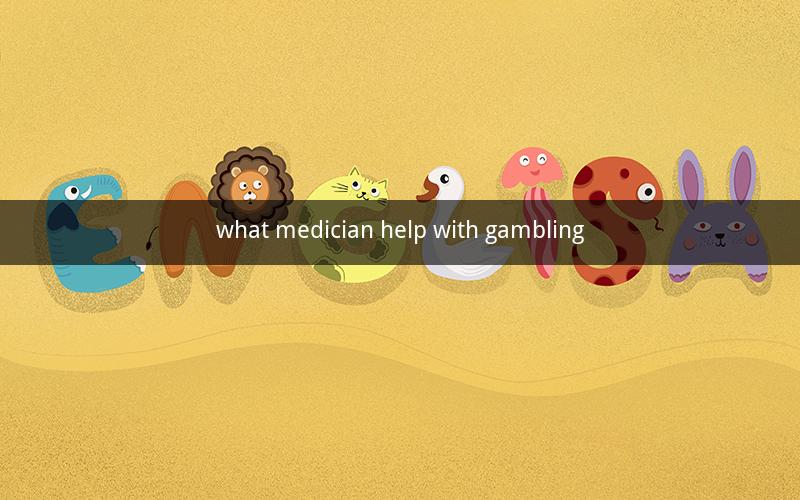
Understanding the Role of Medicine in Treating Gambling Disorders
Table of Contents
1. Introduction to Gambling Disorders
2. The Impact of Gambling on Mental Health
3. Types of Medications Used
3.1 Antidepressants
3.2 Antipsychotics
3.3 Stimulants
3.4 Mood Stabilizers
4. The Mechanism of Action
5. Considerations for Medication Use
6. Side Effects and Risks
7. Combining Medication with Therapy
8. Conclusion
1. Introduction to Gambling Disorders
Gambling disorders, also known as gambling addiction, are characterized by an inability to control the urge to gamble, despite negative consequences. This condition affects individuals of all ages, genders, and socioeconomic backgrounds. While the exact cause of gambling disorders is not fully understood, it is believed to be influenced by a combination of genetic, environmental, and psychological factors.
2. The Impact of Gambling on Mental Health
Gambling disorders can have severe consequences on an individual's mental health. These include:
- Anxiety and depression
- Stress and tension
- Sleep disturbances
- Suicidal thoughts
- Relationship problems
3. Types of Medications Used
Several types of medications have been found to be effective in treating gambling disorders. These include:
3.1 Antidepressants
Antidepressants, such as selective serotonin reuptake inhibitors (SSRIs) and serotonin-norepinephrine reuptake inhibitors (SNRIs), are commonly used to treat the underlying mental health issues associated with gambling disorders. They work by increasing the levels of neurotransmitters like serotonin and norepinephrine in the brain, which can help alleviate symptoms of anxiety, depression, and stress.
3.2 Antipsychotics
Antipsychotics, particularly second-generation antipsychotics (SGAs), may be prescribed to individuals with gambling disorders who also have co-occurring mental health conditions, such as bipolar disorder or schizophrenia. These medications can help manage symptoms of psychosis and reduce the urge to gamble.
3.3 Stimulants
Stimulants, such as methylphenidate and amphetamines, are sometimes used to treat attention-deficit/hyperactivity disorder (ADHD), which can be a contributing factor to gambling disorders. These medications can help improve focus and reduce impulsivity, which may reduce the urge to gamble.
3.4 Mood Stabilizers
Mood stabilizers, such as lithium and valproate, are primarily used to treat bipolar disorder. However, they may also be beneficial for individuals with gambling disorders who have mood swings or impulsivity issues.
4. The Mechanism of Action
The mechanism of action of these medications varies depending on the specific medication. Antidepressants work by increasing the levels of neurotransmitters in the brain, while antipsychotics can help manage symptoms of psychosis and reduce impulsivity. Stimulants and mood stabilizers work by targeting specific neurotransmitter systems in the brain to improve focus and regulate mood.
5. Considerations for Medication Use
Before starting medication treatment for a gambling disorder, several factors must be considered:
- The individual's overall health and medical history
- The presence of co-occurring mental health conditions
- The potential for drug interactions and side effects
- The individual's response to previous treatment attempts
6. Side Effects and Risks
All medications come with potential side effects and risks. Common side effects of antidepressants include dry mouth, constipation, and sexual dysfunction. Antipsychotics can cause dizziness, drowsiness, and weight gain. Stimulants may lead to increased heart rate and blood pressure, while mood stabilizers can cause kidney and liver problems.
7. Combining Medication with Therapy
Medication treatment for gambling disorders is often most effective when combined with therapy. Cognitive-behavioral therapy (CBT) can help individuals develop coping strategies, identify triggers for gambling, and change negative thought patterns. Family therapy and group therapy can also provide support and resources for individuals struggling with gambling disorders.
8. Conclusion
Medication can play a significant role in treating gambling disorders by addressing underlying mental health issues and reducing the urge to gamble. However, it is important to consider the individual's unique circumstances and preferences when selecting a treatment plan. Combining medication with therapy can enhance the effectiveness of treatment and improve the chances of long-term recovery.
Questions and Answers
1. What is the primary purpose of medication in treating gambling disorders?
- Medication is primarily used to address underlying mental health issues and reduce the urge to gamble.
2. Can medication alone effectively treat a gambling disorder?
- While medication can be effective, it is often most beneficial when combined with therapy.
3. Are there any side effects associated with antidepressants used to treat gambling disorders?
- Yes, common side effects include dry mouth, constipation, and sexual dysfunction.
4. What is the role of antipsychotics in treating gambling disorders?
- Antipsychotics can help manage symptoms of psychosis and reduce impulsivity.
5. How can stimulants contribute to the treatment of gambling disorders?
- Stimulants can help improve focus and reduce impulsivity, which may reduce the urge to gamble.
6. Are mood stabilizers effective for all individuals with gambling disorders?
- Mood stabilizers are primarily used for individuals with co-occurring bipolar disorder or mood swings.
7. What should be considered before starting medication treatment for a gambling disorder?
- Factors to consider include the individual's overall health, co-occurring conditions, potential side effects, and previous treatment attempts.
8. How can therapy complement medication treatment for gambling disorders?
- Therapy can help individuals develop coping strategies, identify triggers, and change negative thought patterns.
9. What is the role of family therapy in treating gambling disorders?
- Family therapy can provide support and resources for individuals and their families affected by gambling disorders.
10. Can medication treatment for gambling disorders lead to long-term recovery?
- While medication can be a part of long-term recovery, it is often most effective when combined with ongoing therapy and lifestyle changes.